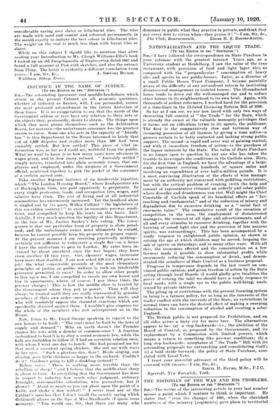NATIONALIZATION AND THE LIQUOR TRADE. [To THE EDITOR OF THE
" SPECTATOR."] SIR,—I have followed the correspondence on State Purchase in your columns with the greatest interest Years ago, as a University student at Heidelberg,- I saw the value of the true restaurant, with provision of food and light lager ales, as compared with the " perpendicular " consumption of heavy ales and spirits in our public-houses. Later, as a director of a small Public House Trust Company, I became painfully aware of the difficulty of any out-and-out reform by instituting disinterested management in isolated houses. The ill-conducted house tends to drive out the well-managed one and to reduce other houses in its neighbourhood to its own level. Again, with thousands of ardent reformers, I worked hard for the provision of a time-limit in the ill-fated Licensing Reform Bill of 1908.
So far as I can see, we are now faced with only two ways of
recovering full control of "the Trade" for the State, which is already the owner of the valuable monopoly privileges that it farms out on ridiculous terms to its agents, the publicang. The first is the comparatively slow and tortuous way of resuming possession of all licences by giving a time notice—a process certain to be hotly contested and lacking strong public support. The second—a rapid and surer way of gaining control, and with it immediate freedom of action—is the purchase of the liquor interests by the State. The value of State Purchase is no longer open to question by any one who has taken the trouble to investigate the conditions in the Carlisle area. Here, for the first time in England, we have the advantage of a large- scale experiment covering hundreds of square miles and involving an expenditure of over half-a-million pounds. It is a most convincing illustration of the effects of wise manage- ment by an authority not concerned with peddling restrictions, but with the critical problem of creating (with the help and consent of representative citizens) an orderly and sober public where disorder and drunkenness ran riot. Well might the Chief Constable of Carlisle speak of its beneficial effects as "far- reaching and fundamental," and of the reduction of misery and degradation due to excessive drinking as a "social fact of enormous value." The cumulative result of the cessation of competition in the area, the employment of disinterested managers, the removal of all signs and advertisements, and of all and every stimulus to excessive drinking, together with the brewing of sound light ales and the provision of less noxious spirits, was extraordinvy. This has been accompanied by a ready response to enlightened public opinion, as shown in raising the age at which children may be served, forgoing the sale of spirits on Saturdays, and in many other ways. With all this, the economies effected and the concentration on a few licences made it possible to show substantial profits while enormously reducing the consumption of drink, and demon- strated the soundness of State Control as a business proposal.
Progress in temperance depends in the last resort on con- vinced public opinion, and given freedom of action by the State acting through local Boards (I would gladly give localities the power of vetoing the sale) we should have a ready response to local needs, with a single eye to the public well-being, unob- scared by private interests.
The piling up of restrictions with the present licensing system in being is a fatuous policy, for so.-long as the interests of the trader conflict with the interests of the State, no restrictions in normal times can have the desired effect of making a sweeping reduction in the consumption of alcohol and creating a sober England.
The British public is not prepared for Prohibition, and on all sides arises a lusty cry for more beer. The alternatives appear to be : (a) a step backwards—i.e., the abolition of the Board of Control, as proposed by the Government, and its replacement by a Commission with limited powers, which means a return to something like 'Pre-war conditions; (6) a long step backwards: acceptance of " the Trade" Bill with its astounding proposals for entrenching and consolidating itself; (c) a bold stride forward the policy of State Purchase, asso- ciated with Local Veto.
I trust your powerful advocacy of the third policy will be crowned with success.-L-I am, Sir, dc.,
SAMUEL 11. DAVIES, M.Sc., F.I.C.
Byeeroft, New Ears wick, York.


































 Previous page
Previous page